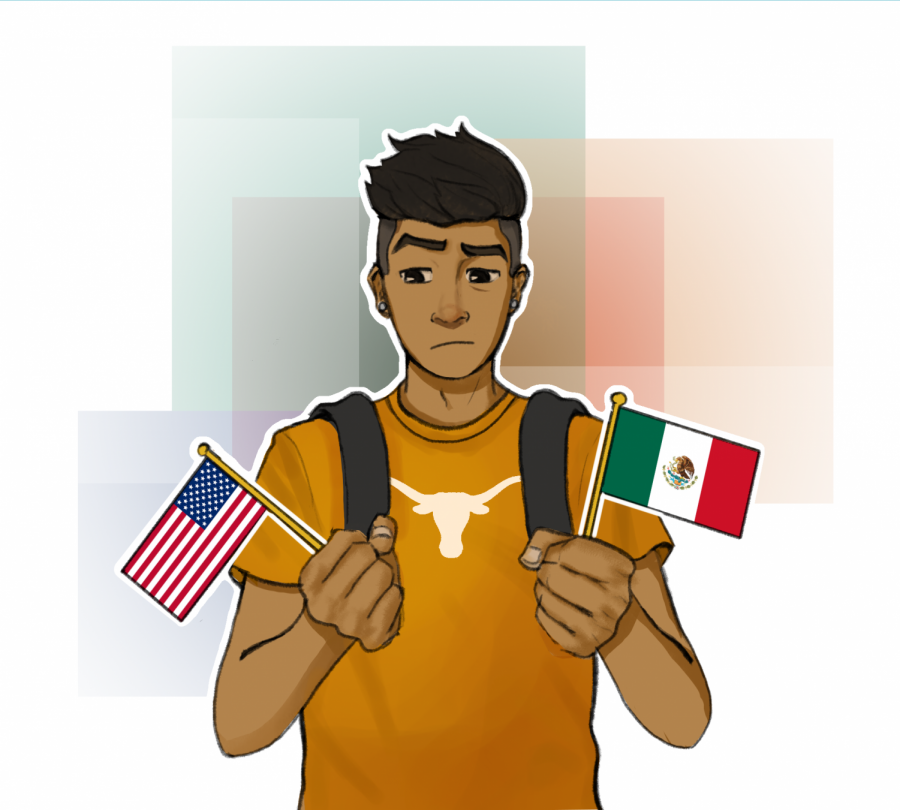Students with dual citizenship share the benefits of being from multiple countries
December 15, 2021
Editor’s Note: This article first appeared as part of the November 12 flipbook.
Peering out an airplane window with wide 9-year-old eyes, Sofia Vargas Karam examined the sprawling Houston skyline for the first time, anticipating her year-long stay in the United States. Three years later, Vargas Karam, originally from Mexico City, did what her 9-year-old self never imagined: She obtained her American citizenship and became a full-time Texas resident.
Attending college in the United States, where obtaining citizenship is a demanding process, UT students with dual citizenship offer a different perspective on the meaning of being a citizen of other countries. Though citizenship status ultimately lies in a few signed documents, possessing citizenship in multiple countries can change the relationship between physical location and cultural identity.
With citizenship in France, Mexico and the U.S., journalism freshman Vargas Karam said she faced harassment from peers while acclimating to American culture in junior high school.
“I did the morning announcements for a little bit, and if I said a word wrong because of my accent or if I messed up on grammar, (classmates) would be like, ‘Oh my gosh, get out of the country,’” Vargas Karam said.
However, with her newly acquired American citizenship, Vargas Karam said she felt empowered to stand up to close-minded classmates.
“Citizenship was kind of a breather,” Vargas Karam said. “There’s no need to prove anything to anybody, because I’ll just pull out a picture of my passport.”
Vargas Karam said having citizenship in multiple countries grants her a different understanding of what citizenship means to multiple cultures.
“(Dual citizenship) 100% shifted my perspective,” Vargas Karam said. “I think about my cousin who has thought about coming to the U.S. for college, and he sees (U.S. citizenship) as such a barrier because he doesn’t have it.”
Raised in an American household by French parents, Camille Layen, a radio-television-film sophomore, said she obtained French citizenship at birth. When she considered her future, she said she never limited herself to living in America forever.
“I went to visit (France) two years ago and stayed for a really long time,” Layen said. “That opened my eyes and made me realize I want to live there sometime in the future. Being able to speak to everyone in French and having all the same customs was really cool.”
Besides celebrating Bastille Day with her family every July, Layen said she incorporates her French culture into her day-to-day life by sharing her heritage with non-French friends through the world’s most widely recognized language: food.
“A really important part of French culture is we really take pride in all of our meals, and not just the food, but being together and having dinner,” Layen said.
After moving to Texas for college, design junior Irene Chamorro-Beckenhauer said her Peruvian citizenship solidified her ability to speak up against stereotypes surrounding Latin Americans.
“I think (my Peruvian citizenship) … makes me unique in Texas more than anywhere else,” Chamorro-Beckenhauer said. “All Hispanics are kind of grouped as Mexicans here. Being Peruvian is very different, … and I like educating people here about how different the two (cultures) are.”
Before earning Peruvian citizenship at 17, Chamorro-Beckenhauer said she visited Huancayo, Peru, with family every two years. While she enjoyed connecting with extended family, she said she never felt fully accepted in either culture until she received citizenship.
“It’s essential to stay connected to my culture,” Chamorro-Beckenhauer said. “I know it’s just a legal document, but there’s something special about being able to say I am a Peruvian citizen.”



